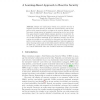Free Online Productivity Tools
i2Speak
i2Symbol
i2OCR
iTex2Img
iWeb2Print
iWeb2Shot
i2Type
iPdf2Split
iPdf2Merge
i2Bopomofo
i2Arabic
i2Style
i2Image
i2PDF
iLatex2Rtf
Sci2ools
FC
2010
Springer
2010
Springer
A Learning-Based Approach to Reactive Security
Despite the conventional wisdom that proactive security is superior to reactive security, we show that reactive security can be competitive with proactive security as long as the reactive defender learns from past attacks instead of myopically overreacting to the last attack. Our game-theoretic model follows common practice in the security literature by making worst-case assumptions about the attacker: we grant the attacker complete knowledge of the defender’s strategy and do not require the attacker to act rationally. In this model, we bound the competitive ratio between a reactive defense algorithm (which is inspired by online learning theory) and the best fixed proactive defense. Additionally, we show that, unlike proactive defenses, this reactive strategy is robust to a lack of information about the attacker’s incentives and knowledge.
Related Content
| Added | 15 Aug 2010 |
| Updated | 15 Aug 2010 |
| Type | Conference |
| Year | 2010 |
| Where | FC |
| Authors | Adam Barth, Benjamin I. P. Rubinstein, Mukund Sundararajan, John C. Mitchell, Dawn Song, Peter L. Bartlett |
Comments (0)

